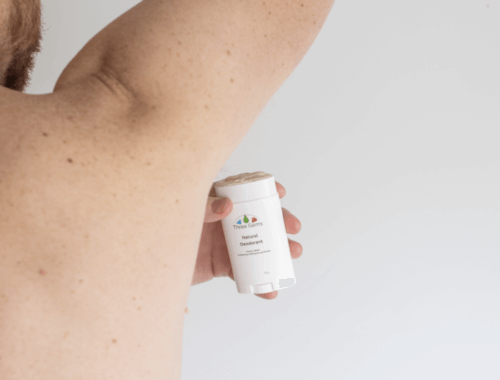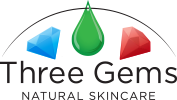4 reasons mainstream deodorants aren’t great for you

…and why Three Gem’s Natural Deodorant is the natural better choice!
Why use natural deodorant? We use deodorant to tackle two of our most embarrassing body issues: sweat and body odour. Body odour is produced by bacteria breaking down the fatty oils in your sweat, which releases a smelly gas. Deodorants either mask the smell or have antimicrobials that kill the bacteria that cause the smell. Whereas anti-perspirants actually block the ducts that produce sweat, removing the food source of the bacteria.
But what is in these fragrant mixtures that we apply under our arms every day? It seems they contain a whole lot of ingredients that cannot even be pronounced! Have you considered that we wouldn’t dare swallow a concoction of chemicals we were unsure of, yet we are quite happy to smear and spray them under our armpits where it can readily enter straight into the bloodstream?
So, here are 4 ingredients – and reasons – why mainstream deodorants should be avoided… and why Three Gems Natural Deodorant is the better choice – naturally!
- AluminiumAluminium is found in anti-perspirant deodorants which block sweat glands (not lymph nodes). It can cause ‘gene instability’ according to research by Philippa Darbre, an oncologist at the University of Reading, meaning it can increase our cells’ tendency to mutate. An excess of aluminium has also been linked to bone diseases or dementia, such as Alzheimer’s. Excess aluminium is usually filtered out of your body by your kidneys. But those with weakened kidney function can’t filter aluminium fast enough and should avoid using products that contain aluminium.
- ParabensParabens are preservatives in deodorants. They prevent fungi, bacteria, and yeast from growing on deodorant. Parabens are absorbed through the skin and mimic estrogen in the body. Higher exposure to estrogen over a lifetime can lead to a greater breast cancer risk. As Philippa Darbre says, “Much more research is needed” but, that, in her view, the “existing evidence suggests that long-term, low-dose mixtures of environmental chemicals – including parabens – could cause cancer.”
- TriclosanTriclosan is added to deodorants in order to kill bacteria on the surface of the skin. It is an endocrine disruptor, meaning it can mimic hormones or interfere with hormonal signaling. Research has linked Triclosan to “unusually hormone activity”, impairment of Thyroid activity, and an increased risk of breast cancer.
- PhthalatesPhthalates help the fragrance of deodorant stick to your skin. They also disturb the way our bodies produce and use testosterone. The primary concern with phthalates is their ability to disrupt the endocrine system. This can play havoc with the reproductive ability in men and foetal development in pregnant women.
So – what do we think about all this?
There is a lot of research and advice out there about deodorants and anti-perspirants. None of which can conclusively state that mainstream deodorants directly cause any of the health concerns mentioned. However, here’s our advice…
Err on the side of caution. So why risk it when there are natural alternatives that are guaranteed to do no harm? Such as our natural deodorant which comes in two varieties: a convenient wind-up stick or a plastic-free pot.
Our natural deodorant is made with baking soda and petitgrain oil, as well as natural butters and oils, arrowroot, a little beeswax, and natural vitamin e. Also – we use no water, no fillers, no chemicals, no nasties at all – just pure natural goodness. Specially formulated to keep you dry and odour-free so that you can raise your arms with confidence!
We are so confident that this deodorant will work for you, we gladly offer you a money-back guarantee if it doesn’t.
Grab yourself some today, and let us know how it works for you!
Click here to order your Natural Deodorant
References:
Penn Medicine – Penn Medicine
Time – Time
Ted – TED
National Cancer Institute – NIH




